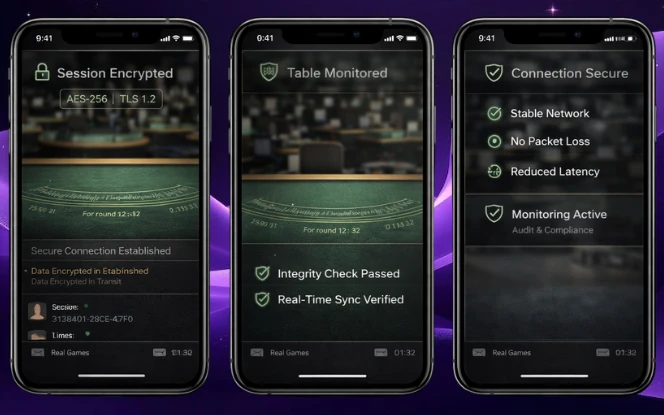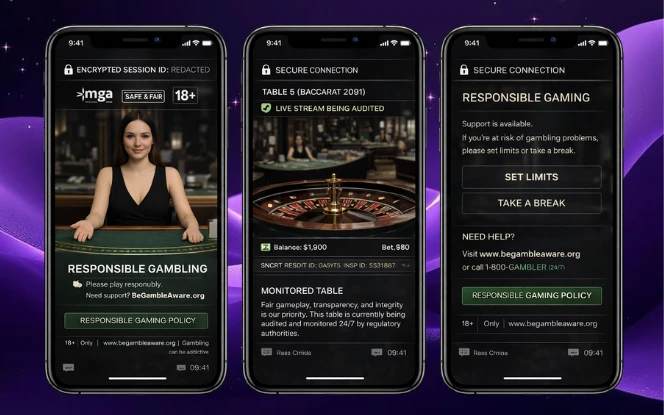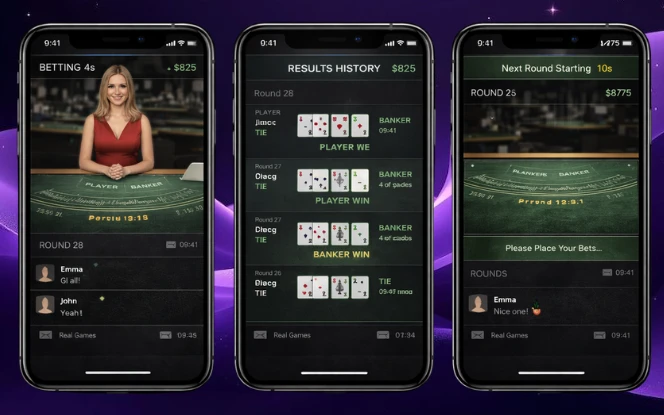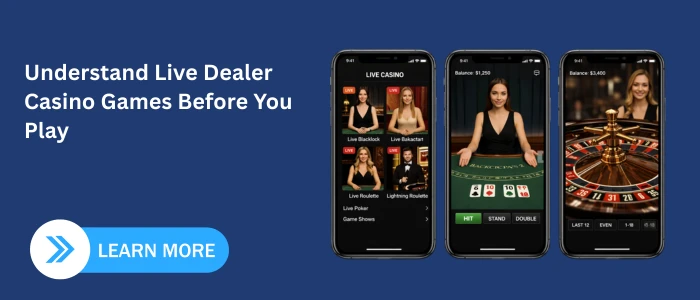Introduction
How Live Dealer Casino Games Work comes down to the interaction between real dealers, live video streaming, and secure betting software. Live casino platforms stream physical tables to players online, allowing them to watch real gameplay while placing digital bets.This blog explains studio operations, dealer roles, streaming technology, software systems, security, and payouts in clear, practical terms, offering a complete view of live casino gaming.
For a broader technical perspective, explore our live casino platform overview explaining how streaming, software, and dealers work together.
Core Concept of Live Dealer Gaming
Real Dealers and Physical Gameplay

Live dealer platforms rely on trained casino professionals who operate physical tables inside controlled studio environments. Cards are shuffled manually, roulette wheels spin naturally, and outcomes depend entirely on physical actions rather than automated systems.
This model includes:
- Professional dealers trained in casino procedures
- Physical cards, wheels, and tables
- Fixed cameras capturing every action
- Continuous, uninterrupted gameplay
Because results are generated physically, players can follow each step in real time. This visibility is a key reason Live Dealer Casino Games build trust among players. The pacing also mirrors land-based casinos, creating familiarity. Digital systems only record outcomes and manage payouts, while the dealer remains central to gameplay.
For deeper insight into dealer-led environments, review our live casino operations guide outlining studio workflows and dealer responsibilities.
Digital Participation Layer

Although gameplay occurs physically, players interact through digital interfaces layered over the live video feed. This layer manages betting logic, timing, and account balances while keeping the experience smooth and transparent.
Key elements include:
- On-screen betting panels
- Countdown timers for wagers
- Automatic bet locking
- Instant result updates
This separation ensures financial accuracy without interfering with real gameplay, maintaining clarity and consistency throughout each round.
Studio Environment and Dealer Operations
Studio Infrastructure

Live dealer studios are purpose-built spaces designed to support reliable, compliant, and transparent operations. Every detail contributes to consistent gameplay and visual clarity for players.
Studios typically include:
- Standardized tables with fixed layouts
- Professional lighting for clear visibility
- High-definition cameras at defined angles
- Sound-controlled rooms
- Supervisor monitoring stations
Layouts remain unchanged during live sessions, and camera positions stay fixed. Supervisors oversee tables continuously and intervene if irregularities appear. This structured environment allows global audiences to participate without compromising operational control.
To understand how regulated studios are designed, see our Mechanics of Mobile Casino Games covering layouts, cameras, and compliance controls.
Dealer Responsibilities

Dealers manage game flow, maintain pacing, and announce outcomes clearly. They follow strict operational procedures and never handle player funds directly.
Core responsibilities include:
- Managing cards or roulette wheels
- Announcing results clearly
- Following compliance rules
- Maintaining consistent gameplay rhythm
All financial actions process digitally, reducing error and improving accountability.
Streaming and Technology Framework
Video and Audio Streaming

Real-Time Casino Streaming Technology enables live dealer platforms to deliver smooth, low-latency video feeds to players worldwide. Video and audio synchronization is critical to maintain trust and gameplay accuracy.
Streaming infrastructure includes:
- Low-latency video encoding
- High-bandwidth servers
- Global content delivery networks
- Redundant backup systems
Audio aligns precisely with video so dealer announcements match physical actions. Stability matters more than visual effects, defining the quality of Live Casino Game Technology across platforms.
For technical details on latency and synchronization, read our real-time gaming streaming architecture guide
Result Recognition Systems

Once physical outcomes occur, recognition systems convert them into digital results that betting engines can process.
These systems include:
- Optical card recognition
- Roulette outcome sensors
- Manual verification layers
Results feed directly into the platform, triggering payout calculations without altering outcomes.
Software Architecture and Player Interaction
Platform Software Structure

Live Dealer Casino Software connects video streams, betting engines, and player accounts into a unified platform. Scalability remains essential, as a single table may host thousands of participants simultaneously.
Core software functions include:
- Session management
- Bet validation
- Outcome processing
- Compliance reporting
The platform ensures accuracy across all connections while maintaining detailed logs for audits and dispute resolution.
To explore backend scalability and session handling, refer to our live casino software architecture overview
Betting Interface and Controls

Players interact through structured, intuitive interfaces designed for clarity and control.
These interfaces provide:
- Clear betting options
- Visual countdown timers
- Game history access
- Real-time balance updates
Once bets lock, no changes occur, preventing disputes and ensuring fair gameplay.
Security, Compliance, and Fairness
Security Measures

Live dealer platforms apply multiple security layers to protect players and operators from fraud and manipulation.
Security controls include:
- Encrypted video and data streams
- Tamper-resistant equipment
- Continuous table monitoring
- Detailed audit logs
Independent agencies review systems regularly, reinforcing transparency and trust.
Regulatory Oversight

Live dealer casino platforms operate under regulated frameworks that ensure fair and transparent gameplay. Licensing authorities define rules for dealer conduct, studio operations, and system security. Operators must comply with these standards to remain active.
Key oversight areas include:
- Valid gaming licenses
- Dealer verification and training
- Approved equipment and studios
- Routine audits and monitoring
Because live games are recorded, regulators can review gameplay when needed. This oversight protects players and ensures platforms follow legal requirements.
Game Flow, Payouts, and User Experience
Game Completion and Payouts

Each round follows a predictable cycle. After outcomes occur, the system validates results, settles bets, and updates player balances automatically.
The payout process includes:
- Outcome confirmation
- Bet settlement
- Balance updates
- Transaction logging
Automation improves speed and accuracy while allowing dealers to proceed without delays.
For a step-by-step breakdown of settlements, review our casino payout and transaction processing guide.
Player Trust and Experience

Player trust develops through visible and consistent gameplay. Live dealer games allow players to see real actions, which makes outcomes easier to understand.
Trust factors include:
- Clear dealer actions
- Fixed betting timers
- Accessible game history
- Stable video streams
As players gain familiarity, confidence improves. Transparent gameplay and reliable performance reduce disputes and create a steady user experience.
Conclusion
Live dealer gaming combines physical casino play with digital convenience. Real dealers, secure streaming, and regulated environments create a transparent experience many players prefer.
By understanding How Live Dealer Casino Games Work, players gain clarity on fairness, technology, and operations. For operators, success depends on disciplined execution and compliance.
For development, integration, or consulting support, Contact us SDLC Corp.
FAQ'S
How Do Live Dealer Casino Games Work In Real Time?
Live dealer casino games work by streaming real casino tables to players using live video. Dealers handle physical cards or wheels, while players place bets digitally through secure interfaces.
What Technology Is Used In Live Dealer Casino Games?
Live casino game technology includes high-definition cameras, real-time casino streaming technology, result recognition systems, and backend software that processes bets and payouts instantly.
Are Live Dealer Casino Games Fair And Secure?
Yes, live dealer casino games are regulated and monitored. Security measures include encrypted streams, continuous surveillance, and audit logs, ensuring transparent gameplay and fair outcomes.
What Is The Difference Between Live Casino Games And Online Casino Games?
Live dealer casino games use real dealers and physical equipment, while traditional online games rely on automated systems. This makes live casino gaming more transparent and interactive.
What Role Does Software Play In Live Dealer Gaming?
Live dealer casino software connects video streams, betting systems, and player accounts. It ensures accurate result processing, real-time updates, and regulatory compliance across the platform.
Where Are Live Dealer Casino Games Hosted?
Live dealer casino games are hosted in licensed studios or regulated casino floors equipped with professional dealers, cameras, and streaming infrastructure.
Do Live Dealer Casino Games Use Random Number Generators?
No, live dealer casino games rely on physical actions such as card dealing or wheel spins, while software records outcomes and manages betting.
How Many Players Can Join One Live Dealer Table?
A single live dealer table can host hundreds or thousands of players simultaneously, as each player bets digitally while watching the same game.
Are Live Dealer Casino Games Available On Mobile Devices?
Yes, most live dealer casino games are optimized for mobile devices, allowing players to stream gameplay and place bets on smartphones and tablets.
What Happens If A Live Dealer Stream Disconnects?
If a stream disconnects, the system records the game state and restores gameplay once reconnected, ensuring bets and outcomes remain accurate.




